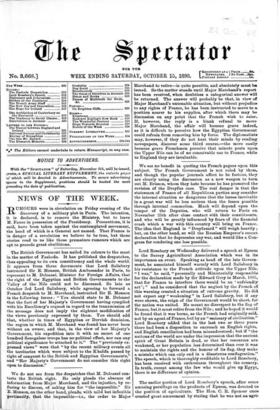We do not see from the despatches that M. Delcasso
con- tests the British right. He only pleads the absence of information from Major Marchand, and the injustice, by re- fusing to discuss, of asking him for "the impossible." Sir E. Monson, on the other hand, pleads, with mild but inflexible 'pertinacity, that the impossible—i.e., the order to Major Marchand to retire—is quite possible, and absolutely must be issued. So the matter stands until Major Marchand's report has been received, when doubtless a categorical ans wer will be returned. The answer will probably be that, in view of Major Marchand's untenable situation, but without prejudice to any rights of France, he has been instructed to move to a position nearer to his supplies, after which there may be discussion on any point that the French wish to raise. If, however, the reply is a blank refusal to move Major Marchand, the affair will become grave indeed, as it is difficult to perceive how the Egyptian Government could refrain from removing him by force. The diplomatists may, however, if they do not heat their minds by reading newspapers, discover some third course,—the more easily because grave Frenchmen perceive that minute posts upon. the Upper Nile can be of no conceivable use to France, while to England they are invaluable.






































